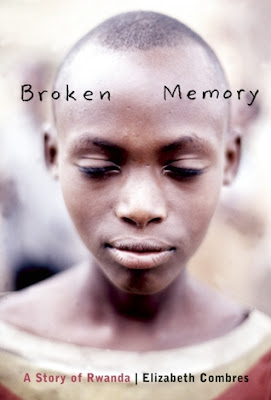"Hiding behind a chair, five-year-old Emma can't see her mother being murdered, but she hears everything. When the assassins finally leave, the terrified girl stumbles away from the scene, motivated only by the memory of her mother's last words: "You must not die, Emma!" Eventually, Emma is taken in by an old Hutu woman who risks her own life to hide the child. A quiet bond grows between the two, but long after the war ends, Emma is still haunted by nightmares. When the country establishes gacaca courts to allow victims to face their tormentors, Emma is uneasy and afraid. But through her growing friendship with a young torture victim and the encouragement of an old man charged with helping child survivors, Emma finds the courage to begin the long journey to healing. Moments of grace and tenderness illuminate this spare, sensitive novel, which tells the story of the 1994 attacks in an age-appropriate manner."
My only knowledge of the Rwandan genocide of 1994 comes from the film Hotel Rwanda. It's a powerful and at times difficult to watch film. It was like taking a bath in cold water. You wake up very suddenly, very abruptly, even though you hadn't registered that you were asleep. No peace and a complete lack of comfort. There is no hand-holding while introducing this part of history.
While I don't think it's a good idea to read Elisabeth Combre's book and be done with the Rwanda of 1994, I think it's a good book to read if you have a good idea of why this happened. It sort of completes the story that I started by watching Hotel Rwanda. The story briefly takes place as the genocide is occurring, but most of the story shows post-genocide Rwanda. It shows how people are managing afterwards. How people like Emma and Ndoli cope, I think, are true testaments to just how horrific this time in history was. They still have nightmares and it pains Emma that she can't remember her family. She never got to know her family, not really, and their deaths did not have to happen. How do you handle this from age four into adulthood? This is something I'll never understand and I hope never fully comprehend.
If you read this book and don't have even a little bit of background on this time in history, I suggest that you read the Author's Note first. Combres explains, briefly, how Rwanda reached the point that it did in 1994. I found it extremely helpful when it came to filling my gaps in knowledge.
I give 'Broken Memories':
Thanks for Reading!
--Jude
My only knowledge of the Rwandan genocide of 1994 comes from the film Hotel Rwanda. It's a powerful and at times difficult to watch film. It was like taking a bath in cold water. You wake up very suddenly, very abruptly, even though you hadn't registered that you were asleep. No peace and a complete lack of comfort. There is no hand-holding while introducing this part of history.
While I don't think it's a good idea to read Elisabeth Combre's book and be done with the Rwanda of 1994, I think it's a good book to read if you have a good idea of why this happened. It sort of completes the story that I started by watching Hotel Rwanda. The story briefly takes place as the genocide is occurring, but most of the story shows post-genocide Rwanda. It shows how people are managing afterwards. How people like Emma and Ndoli cope, I think, are true testaments to just how horrific this time in history was. They still have nightmares and it pains Emma that she can't remember her family. She never got to know her family, not really, and their deaths did not have to happen. How do you handle this from age four into adulthood? This is something I'll never understand and I hope never fully comprehend.
If you read this book and don't have even a little bit of background on this time in history, I suggest that you read the Author's Note first. Combres explains, briefly, how Rwanda reached the point that it did in 1994. I found it extremely helpful when it came to filling my gaps in knowledge.
I give 'Broken Memories':
Thanks for Reading!
--Jude



No comments:
Post a Comment
I love your comments! Comment away!